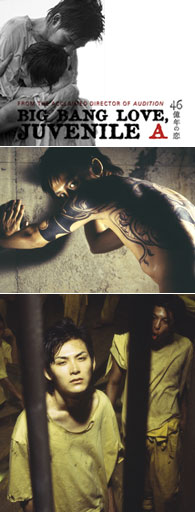In Japanese with English subtitles
Big Bang Love: Juvenile A has the distinction of being the first gay film of 2007 to be screened in Singapore. It also has the distinction of being the weirdest, most confusing gay film since Yonfan's Color Blossoms (2004).

But this time, he might have gone too far. Big Bang Love is purely incomprehensible. What could have been a poignant tale of love between two male prisoners is riddled with too many pretentious symbols and metaphors - like the huge pyramid standing outside the Japanese prison, and the space-rocket beside it. It's all enough to make Freud weep.
The movie begins with a prologue that goes like this: "View Earth from a light a year away and we see one year in Earth's past. Point right, we see a hundred years into the past.
Point left, we see a thousand years into the past Point behind, we see 10,000 years into the past." If Beyonce were to watch this, she'd point left and sing: "To the left, to the left. and into that garbage bag, baby."
We see a young male prisoner named Ariyoshi (played by the pretty-faced, bottom-looking Matsuda Ryuhei) who has just strangled to death his fellow prisoner, Kozuki (Ando Masanobu, who's tanned, taut and tattooed). Nobody in the prison can believe what has happened. After all, Ariyoshi was Koyuki's "bitch." They were supposedly in love. (According to the movie, pretty boys in prison always end up becoming someone's "bitch." But that probably happens in the outside world too.)
The detectives assigned to the case start to dig into the boys' past. Through flashbacks, we see how Ariyoshi and Koyuki met in prison, how Koyuki beat to pulp any guy who tried to touch Ariyoshi, and how Ariyoshi lovingly watched Koyuki as his shirt gets torn each time he gets into a fight. So why did Ariyoshi kill him? Did Ariyoshi kill him?
Big Bang Love is filmed on a soundstage with minimal sets and props. Occasionally, the action moves to a giant CGI screen where computer effects allow the actors to stand before a Mayan pyramid and a space-rocket launch pad, staring in the sky in search of a "triple rainbow."
All these stylistic flourishes and symbolic imagery might have been easier to stomach if the characters of Ariyoshi and Koyuki and their relationship were more firmly established. But director Takashi seems so involved in conjuring his strange, peculiar images that the film fails to engage us on any emotional level.
Though it lasts for only 84 minutes, the film drags like an experimentation by overenthusiastic film students. The actors do their best to help the audience understand their characters and make out what's going on, but the director beats them at every turn.
Is Takashi displaying his genius or pulling a prank? Is this art or something else? Is this a cinematic breakthrough or a misfire? See it for yourself. Maybe you'll understand it better then I did.
